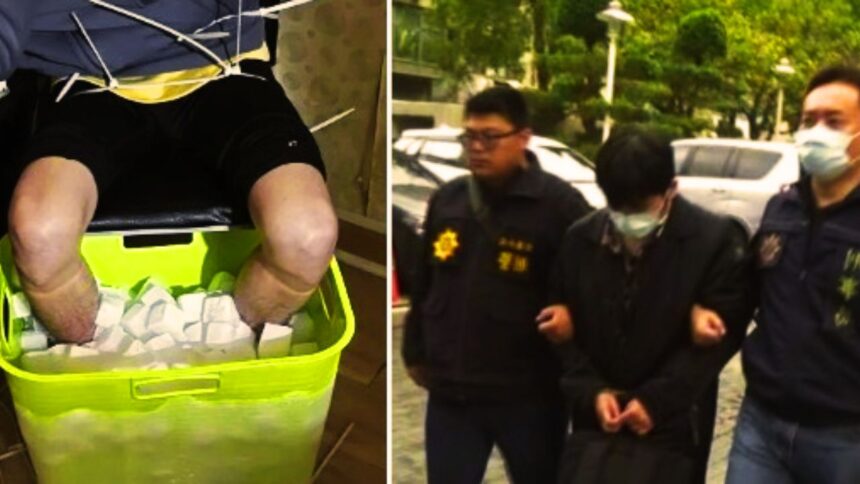A shocking case of insurance fraud has emerged from Taiwan, where a university student resorted to extreme measures in hopes of cashing in on a hefty insurance payout. The 23-year-old student, identified as Zhang, found himself embroiled in a fraudulent scheme orchestrated by a former high school friend, Liao, resulting in dire consequences for both individuals.
According to the Taiwan Criminal Investigation Bureau, Zhang, persuaded by Liao, deliberately subjected his feet to extreme cold by immersing them in a bucket of dry ice for over 10 hours. The intention behind this drastic act was to induce severe frostbite, necessitating a double amputation, and thereby qualify for a lucrative $1.3 million insurance claim.
A student persuaded by his friend to get his legs amputated for a $1.3 million insurance scam wound up getting only $7,200 that he now has to return: prosecutorshttps://t.co/A8KxGp5QVm
— Plato Jenkins 🌊 (@All_Yall_Lying) March 20, 2024
Liao, motivated by financial losses incurred from cryptocurrency trading, manipulated Zhang into signing a legal document, thereby ensnaring him in the fraudulent scheme. Exploiting Zhang’s vulnerability, Liao concocted a fictitious narrative involving purported gangsters pursuing him, further pressuring Zhang into executing the fraudulent insurance scam.
On the pretext of a late-night motorcycle ride, Zhang and Liao orchestrated a staged incident to fabricate Zhang’s alleged frostbite injuries. Prior to the orchestrated event, Zhang had procured multiple expensive insurance policies, including life insurance, travel insurance, and accident insurance, laying the groundwork for the fraudulent claim.
However, investigations revealed glaring inconsistencies in Zhang’s purported injuries. His legs exhibited symmetrical frostbite injuries devoid of shoe or sock marks, incongruent with natural frostbite patterns. Furthermore, weather records contradicted the purported freezing conditions necessary for such severe frostbite injuries to occur naturally.
Subsequent police investigations unearthed incriminating evidence, including the bucket used to freeze Zhang’s feet, insurance documents, and electronic devices. Both Zhang and Liao were apprehended and charged with fraud and aiding and abetting serious injury.

Despite Zhang’s efforts to execute the fraudulent scheme, his payout amounted to a mere $7,200 from one insurer, a fraction of the anticipated windfall. This paltry sum is now subject to seizure, compounding Zhang’s legal predicament and underscoring the futility of his illicit endeavors.
The case serves as a stark reminder of the repercussions of insurance fraud, not only resulting in legal ramifications but also tarnishing one’s reputation and integrity. As incidents of opportunistic fraud witness a surge, authorities worldwide are ramping up efforts to combat fraudulent activities, imposing stricter penalties to deter potential offenders.
In light of escalating financial pressures exacerbated by the pandemic, individuals must exercise vigilance and integrity, refraining from resorting to illicit means for financial gain. Upholding ethical standards and compliance with legal regulations remain paramount in safeguarding societal trust and preserving the integrity of insurance systems.
Sarah’s View:
In Taiwan, a distressing case of insurance fraud has surfaced, involving a university student named Zhang and his former high school friend Liao. Zhang, influenced by Liao, underwent extreme measures by subjecting his feet to dry ice for over 10 hours, aiming to fabricate severe frostbite for a lucrative insurance payout. Liao, facing financial losses, manipulated Zhang into participating in the fraudulent scheme. Despite meticulous planning, investigations uncovered inconsistencies in Zhang’s injuries, leading to the arrest of both individuals. The failed attempt resulted in a nominal payout of $7,200, highlighting the consequences of fraudulent actions. This incident underscores the importance of ethical conduct and adherence to legal standards, especially amidst rising financial pressures. As authorities intensify efforts to combat fraud, maintaining integrity and transparency is crucial for upholding trust in insurance systems and preserving societal values.





